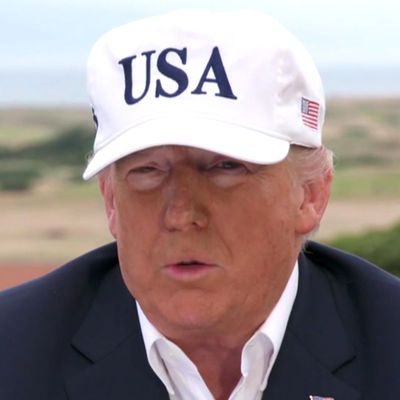
President Trump called the European Union a “foe” of the United States in an interview which aired Sunday, just one day before his controversial — and still unexplained — meeting with Russian president Vladimir Putin in Finland. Asked to name America’s “biggest foe globally right now” during an appearance on CBS’s Face the Nation, the first answer that came to Trump’s mind was the E.U.
“Well I think we have a lot of foes — I think the European Union is a foe — what they do to us in trade. Now, you wouldn’t think of the European Union, but they’re a foe,” Trump replied. He then added that “Russia is a foe in certain respects,” and that China was one economically, though he insisted that he wasn’t judging the countries to be “bad,” but just meant that they were “competitive.”
Trump’s remarks follow an escalating pattern of often haphazard attacks on America’s European allies, especially in recent months as Trump’s attempts to start a global trade war have intensified. Last week at a NATO summit in Brussels, Trump launched a fresh attack on Germany, claiming the country was “totally controlled” and held “captive by Russia” thanks to a gas pipeline deal which the president grossly misrepresented the importance of to Germany’s energy needs. He also criticized America’s NATO partners for not upping their military spending faster than they had already agreed to, only to later up the ante and tell them they would need to spend more of their GDP on defense — 4 percent — than even the U.S. does.
Then, before making his first state visit to the U.K., the president gave a crazy interview to a British tabloid in which he blasted British prime minister Theresa May and praised her primary rival, criticizing her handling of the Brexit crisis — though he later tried to deny having made the (recorded) statement. A few days after that diplomatic disaster, May subsequently revealed that Trump had advised her to sue the E.U. instead of negotiating with them over Brexit, indicating that Trump continues to exclusively view foreign policy through the narrow lens of real estate industry bullying. Another frame for Trump’s criticism of Europe was white nationalism, as he also said last week that it was a shame that European countries were allowing their cultures to be erased by allowing in immigrants.
When Face the Nation’s Jeff Glor told Trump that “a lot of people might be surprised to hear you list the E.U. as a foe before China and Russia,” Trump made it sound as though it upset him to have to challenge Europe, his ancestral homeland. “No I look at them all — look, E.U. is very difficult,” Trump said. “I want to tell you. Maybe the thing that is most difficult — don’t forget both my parents were born in E.U. sectors okay? I mean my mother was Scotland, my father was Germany. And, you know I love those countries.”
Trump went on to repeat last week’s attacks on Germany and America’s NATO allies, and he repeated his backhanded compliment that he respects how E.U. leaders have been able to taken advantage of the U.S. Considering Trump’s statements about other world leaders, he seems to afford much more praise and respect to more authoritarian leaders than most European countries have to offer.
In the same Face the Nation interview, Trump claimed that he had “low expectations” for his Monday meeting with one such leader, Vladimir Putin. Asked to explain why he was meeting with Putin at all, Trump said he would share that after the meeting was over — a non- answer which may mean he didn’t know what to say. “I think it’s a good thing to meet — I do believe in meetings,” he added.
Trump also offered what appeared to be a response to the considerable anxiety over what he might agree to, give away, or improperly disclose during a private meeting with Putin, an ex-KGB agent who has already gotten Trump to publicly repeat Russian propaganda.
“Nothing bad is going to come out of it,” Trump promised.






























